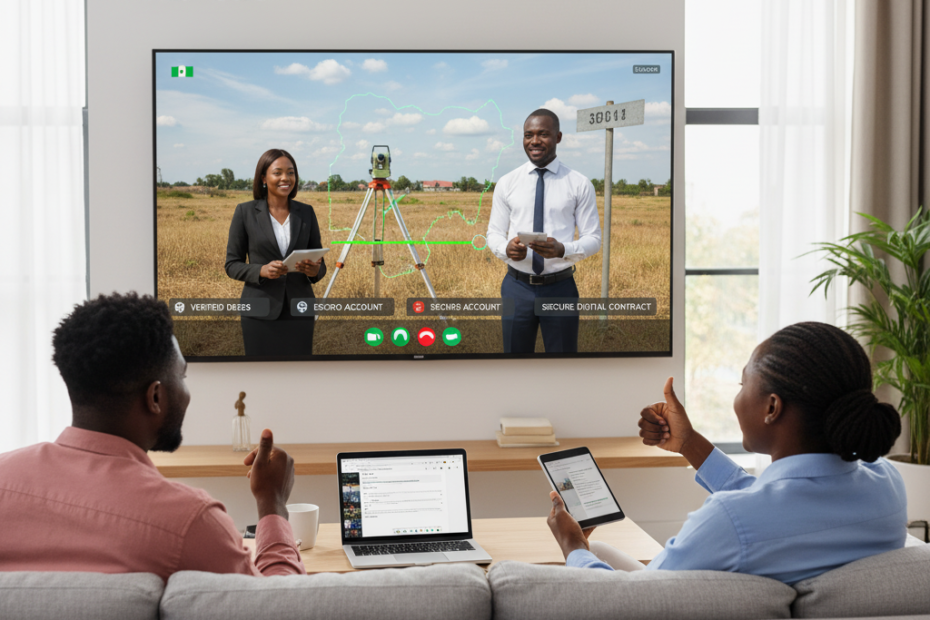Why Safety Matters When Buying Land from Abroad
Buying land in Nigeria while living abroad can be a powerful wealth-creation move — but it also carries heightened risks because you’re relying on remote oversight, unfamiliar documentation, and long-distance verification. Fraudulent titles, double-sales, missing survey plans, and ghost developers are all too common.
For you, as a Nigerian in the diaspora, avoiding these pitfalls is not just about protecting money — it’s about peace of mind, legacy building, and making an investment you’ll still be proud of when you return home.
Key Pre-Purchase Safety Measures
Here are the critical steps you must take before signing any contract or transferring funds.
Choose a Reliable, Accredited Partner
Work only with companies that are duly incorporated (via the Corporate Affairs Commission (CAC) in Nigeria), have verifiable offices, and a documented record of diaspora projects.
Avoid dealing solely with “omonile” (informal local land-owners) when you’re abroad — many of the disputes begin here.
Tip: Ask for the company’s CAC registration number, copies of past transaction references, and evidence of past diaspora investor support.
Verify Title Documents and Survey Plan
Ensure that the land has a registered survey plan, correct coordinates, and that the title is legit (e.g., Certificate of Occupancy (C of O), Governor’s Consent, Deed of Assignment).
Have a credible property lawyer in Nigeria perform a land-search at the relevant Land Registry to confirm no government acquisition or prior encumbrance. (Chaman Law Firm)
Tip: Ask for a photo/video of the plot showing the survey peg markers, boundary fences (if any), adjoining plots and access roads.
Remote Inspection & Video/Virtual Tour
Since you’re overseas, you cannot rely solely on photos. Request a live video walkthrough (Zoom/WhatsApp), drone footage if available, and ask to see the surrounding infrastructure (roads, utilities, neighboring developments) in real-time.
Tip: Record the virtual inspection and keep a timestamp. Compare what you see with satellite imagery (Google Earth) and historical imagery (to spot recent changes or encroachments).
Secure Payment Channels
Never wire funds to personal accounts or cash-only deals. Transfer only to the official corporate account of the real estate company or escrow account. Ensure you receive proper receipts, signed agreements, and payment proof immediately.
Tip: Use a bank transfer or internationally verifiable payment channel. If possible, use an escrow service that holds funds until title is registered or allocation is confirmed.
Post-Purchase and Holding Safeguards
Purchasing the land is just step one. When you’re abroad you’ll need systems in place to protect your investment during the holding phase.
Register the Allocation and Title in Your Name
Make sure the allocation letter and/or deed of assignment is officially registered in your name (or your nominated entity) at the appropriate Land Registry. Only then can you apply for title perfection (C of O / Governor’s Consent) where applicable.
Tip: If you cannot attend in person, you can issue a Power-of-Attorney (POA) to a trusted lawyer or accredited agent in Nigeria — but ensure full transparency and ongoing reporting.
Monitor the Site and Document Progress
Have the managing firm provide quarterly updates with photos and virtual site visits. This is especially important if the land is in a developing estate waiting for infrastructure (fence, roads, utilities).
Tip: Create a simple spreadsheet to track: Date, Photo/Video link, Infrastructure status, Neighbouring plot sales, Encroachment check.
Prepare for Long-Term Holding or Exit Strategy
Define whether you are holding for appreciation, developing yourself later, or leasing the land. Each path has different risk profiles (e.g., no tenant means no income but lower management burden).
Keep in mind currency risk, infrastructure delay risk, and regulatory risk (for example, government acquisition or rezoning).
Tip: Set a review milestone (e.g., 12 months after purchase) to assess whether you’re on track with expected value appreciation or need to pivot.
Why This Process Matters: Real Risks Avoided
Many diaspora investors fall into these traps:
-
Buying land without proper survey plan and later discovering the plot overlaps or is partly allocated.
-
Paying personal agents or “friends of friends” leading to disputes or double-sales.
-
Unexpected demotion of allocations due to government acquisition or lack of infrastructure, especially in Lagos fringe zones. (Real Estate Company in Lagos)
By following a disciplined, documented process, you reduce risk and increase your investment’s value-creation potential.
Call to Action
Ready to invest safely from abroad? At Attractive Property Plus (APP) we’ve built a diaspora-friendly land-purchase process designed for remote investors:
-
Verified titles and survey plans
-
Virtual tours and remote oversight
-
Secure payment structures
-
Optional on-ground stewardship and updates
Schedule your free virtual consultation with our UK/US-based team. Let’s make your next Nigerian land investment safe, smart, and future-proof.
⭐️ Attractive Property Plus
???? Certified Real Estate Consultant
???? +2348060696022
???? www.attractivepropertyplus.com
???? IG: @attractivepropertyplus
